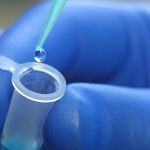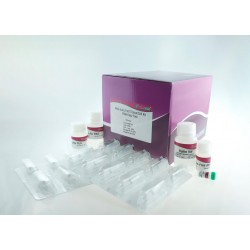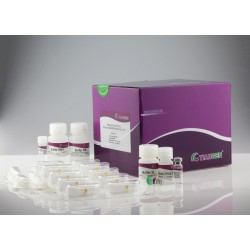RNase Inhibitor




- Stock: In Stock
- Model: 0425
Available Options
Product Introduction
The RNase Inhibitor (Ribonuclease Inhibitor) inhibits the activity of RNases A, B and C by binding them in a noncompetitive mode at a 1:1 ratio. It is not effective against RNase 1, RNase T1, S1 Nuclease, RNase H or RNase from Aspergillus.
RNase Inhibitor, Murine has significantly improved resistance to oxidation compared to the human/porcine RNase inhibitors, and is better for experiments sensitive to high reducer. This product exerts its inhibitory effect at pH 5-9, 25-55℃, showing the strongest inhibitory effect at pH 7-8. A final concentration of 1mM DTT at least in the storage solution is required to maintain the activity of RNase inhibitor.
Applications:
1. RT-PCR
2. cDNA synthesis
3. In vitro transcription/translation
4. Enzymatic RNA labeling reaction
5. Other applications where the integrity of RNA is important
Source: An E. coli strain that carries the Ribonuclease Inhibitor gene from porcine.
Purity: ≥95% by SDS-PAGE
Concentration: 40 U/μL
Definition of Activity Unit: One unit is defined as the amount of RNase Inhibitor required to inhibit the activity of 5ng of RNase A by 50%.
Storage (Dilution) Buffer: 20 mM Tris-HCl, 50 mM NaCl, 5 mM DTT, 50% (v/v) glycerol, pH 7.5.
Inactivation or inhibition:
1. Inhibitors: common denaturants (SDS, urea and all oxidizing reagents (p-chloromercuribenzoate, dissolved oxygen, ions in their higher oxidation states) strongly inhibit RNase Inhibitor and release the RNase bound.
2. Inactivated by heating at 75°C for 10 min.
Storage Conditions: Store at –20°C up to 12 months.
Assay Protocol / Procedures
1. The recommended concentration of RNase Inhibitor in a reaction is 1-2 unit/μl. During assembly of a reaction (eg. in vitro transcription, cDNA synthesis, in vitro translation), RNase Inhibitor should be added before other components that are a possible source of RNase contamination.
Note
1. Enzymes should be placed on ice when used, and stored at -20℃ immediately after use. It is recommended to store separately.
2. For your safety and health, please wear safety glasses, gloves, or protective clothing.























1-250x250.jpeg)
1-250x250.jpeg)

